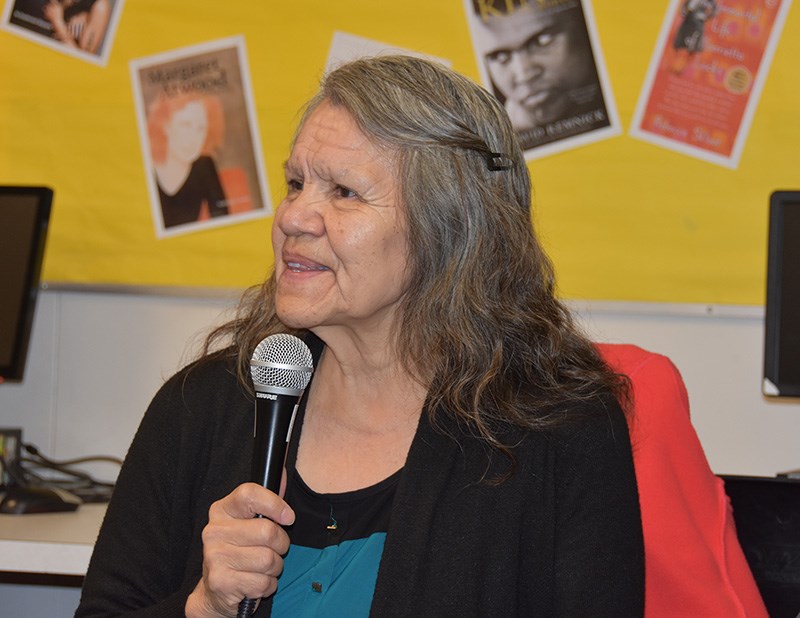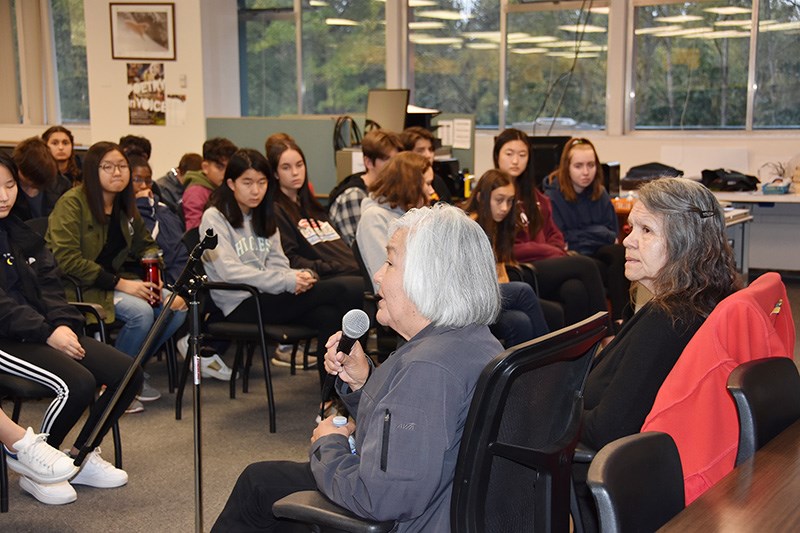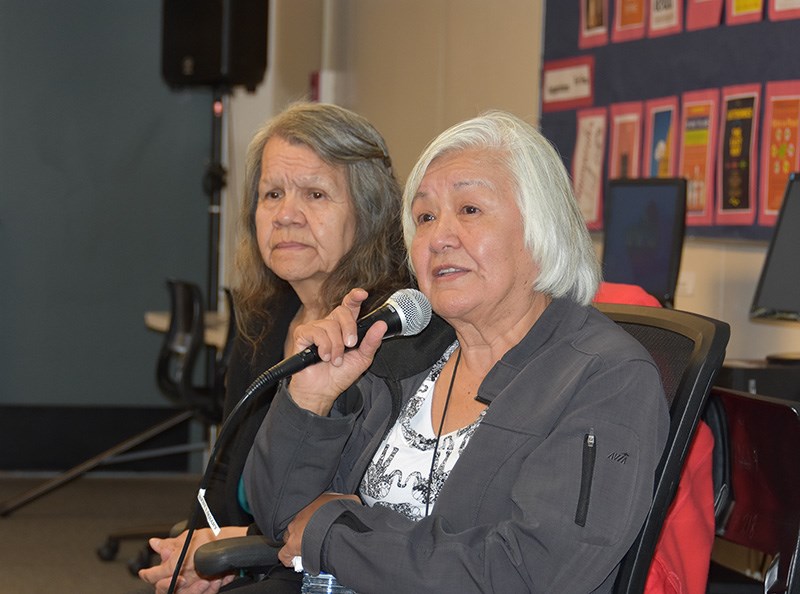It’s one thing to read about Canada’s horrific residential school system that robbed First Nations children of their families, culture and childhood and another to hear about those experiences for hand.
That’s what a group of Dr. Charles Best students did on a sombre and rainy Thursday morning in Coquitlam as part of School District 43’s participation in Orange Shirt Day activities this week.
And from the moment two residential school survivors gripped the microphone to tell their story, the students were transfixed.
They heard the stories of Gertie Pierre, a residential school survivor from the Sechelt school, and Donna Dickeson, who was placed at St. Mary’s residential school in Mission. The kids were asked to imagine how they would have felt had they been removed from their homes and community, and forced to live far away, with strangers — adults, who often abused their position of power.
“It’s taken me years to talk about it,” Dickeson told the students, dabbing her eyes with tissue.

She told the students it took years to come to grips with the terrible experience and to overcome the shame of being an aboriginal women.
Both women described how they were taken from their families at the age of five and made to live at the school, rarely being allowed to return home. They were taught by teachers who called them “dumb Indians” who wouldn’t amount to anything.
“I was scared, I didn’t know anyone,” Dickeson recalled of that first day as a bewildered five-year-old.
She was also sexually assaulted by a nun who found her alone on her first night
Pierre said she was strapped for the slightest infraction, such as asking a fellow student about the homework assignment, and saw other girls taken from their beds at night and sexually abused. Her younger sister was sexually assaulted, and blamed her for not stopping the abuse.
“Why didn’t you protect me?” Pierre recalls her sister saying.
Both women struggled as parents until they went into treatment, and many of their siblings died from the effects of drug and alcohol addiction. Dickeson’s father committed suicide, an example of the generational trauma experienced by children who went to the schools that were spread across Canada, run by various church organizations and the federal government. The last residential school didn't close until the 1990s.
The women’s stories are shared by thousands of residential school survivors, some of whom have gone to court to receive compensation for sexual abuse. Orange Shirt Day was started to recognize the harm of the residential school system and remind people that every child matters.

Orange Shirt Day, Sept. 30, refers to the experience of a B.C. aboriginal woman Phyllis (Jack) Webstad, whose special orange shirt was stripped form her on her first day of residential school.
Pierre and Dickeson, who turned to alcohol for many years to dull the pain caused by their experiences, have since dealt with their trauma. Pierre earned a social work degree at UBC and works with various programs, including providing counselling to people living in the Downtown Eastside, while Dickeson works with police services at the Justice Institute of BC to educate law enforcement about the First Nations residential school experience.
“I was so proud when I achieved that,” Pierre said of receiving her degree at the age of 65.
Pierre was also a founder of a group that lobbied for a national inquiry into Missing and Murdered Indigenous Women and Girls in response to outrage about the lack of official efforts into investigating missing women, including her niece, Cheryl Ann Joe, who was sexually assaulted and brutally murdered.
Thursday's survivor speaking event was introduced as “living history” by teacher Mario Bruneau, who said it’s important for students to hear from survivors and learn about the residential school system as part of efforts towards reconciliation with First Nations people.
Although quietened by the stories, the Best students showed interest in the women’s experiences by asking a number of questions, including one query about what kept the women going while they were in school.
They were told that friendships with other students helped them get through their days, something that many of the students could probably relate to, although their lives differ greatly from those experienced by the speakers.
Dickeson said she talks now so others understand but wishes more people of her generation would share their stories.
“We need to get people talking, there’s so much denial,” she said.
Other schools across the district held similar Orange Shirt Day awareness events, including Gleneagle secondary, whose Con-X Leadership students organized a social media campaign, handed out orange wrist bands and published a brochure to provide students with a background on residential schools.
• For more about Orange Shirt Day, visit www.orangeshirtday.org.



